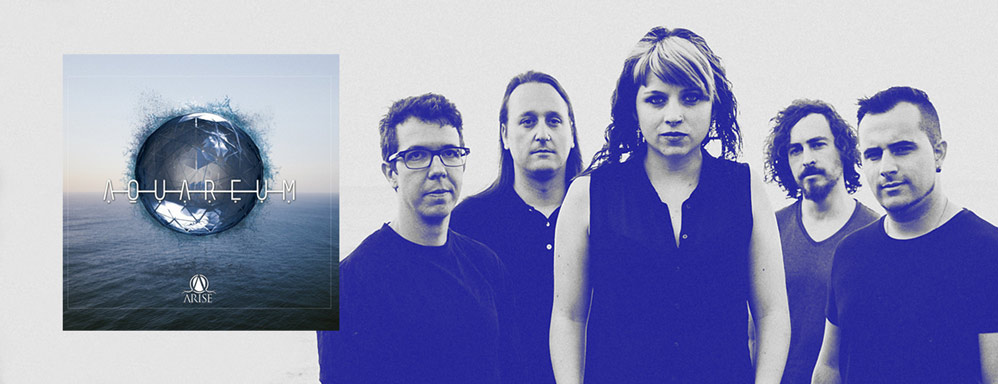Album
Arise: 'Aquareum'
(Self-released, 2015)

This band from Alicante has released a new album and, with it, a prodigy. A melodic metal album that is prodigious because it sung by a female voice in its native Spanish language. But what lies beyond this prodigy, amongst the waters recalled by the album's title?
There are different problems you will have to face if you are in a melodic metal band. Firstly: you will have to show yourself able to go beyond what's already done by Power Metal and melodeath pioneers, specially by the unavoidable Göteborg scene. Secondly, that you have enough maturity to craft meaningful lyrics and musical themes to develop the issues you're going to tackle. Arise masterfully avoids these two problems showing us their intention of giving us something else. Estefania's excelent clean voice, the band's instrumental skills and the carefully created album art all combine to prove their flair and good taste.
The band shows its intention of giving us something else...
The first influences we get to hear are that certain aesthetic lifted from European melodeath, with the band putting to use the experimental resources pioneered by Soilwork or Dark Tranquility, but influenced by Thrice's spirit (a sound that, by the way, we must consider to be very influential to contemporary post-hardcore) and motifs typical of the metalcore scene, like the presence of breakdowns. Those breakdowns, though important, take up a far less important place than in the more rythmical (and paradoxically popular) hardcore and metal variants, acting in a purely dialectical and emotional fashion.
In 'Busca en tu interior' we can appreciate how Estefania shows a precise command over her voice range, specially in the clean segments. Her voice, almost prophetical, is painted upon a canvas of skillful guitars that make this song raise its hands towards a horizon of mist, blurred by a production full of effects.
'Equilibrio' introduces electronic motifs that will develop thoughout the album, and taht reminded me of the prowess of Muse and the "new progressives" from the last decade. This song, being catchy as it is, frees itself from the usual metal constrictions but it also loses some of the strenght that aggresion lends to most songs in the album. For an example, 'Grito al viento' opens with a riff that is full of that virtuous aggression, yet still manages to give way to the milder chorus.
However, a second listen will reveal the album to be a thick estuary that never dies in the waters of any indistinct ocean.
Right after that, the eponymous song ('Aquareum') receives us with a curious game between keyboards and guitars, that becomes established as one of the band's hallmarks. Between the production raging waves some of the beautiful ornaments get lost, but the voice always manages to emerge triumphant amongst tidal masses and nautical sawaying. A guitar solo, more in line with the established traditions of metal music, gets us into the final stages of the song, stages that are condensed and beutifully produced. Their ability to weave together different parts, everyone of them focused in a diffent feeling is another thing that mades them stand out: they can add a lot of depth to their song without enlarging them excessively.
'Espiral' proves that the album keeps getting better and gaining personality as it spins on and on, while respecting the watery imagery that holds it together. Rafa and Albert, the guitarists, accomplish one of the album's most heroic deeds in this very song. The rythmic section doesn't hold back, showing that they are capable of sudden and comple changes of pace and time signature.
'El infierno de los Soñadores' is the last song of the album's central triptych. The clouds end up covering the whole of the sea, depicted now by broken riffs working as cracks from which darkness descends, Estefanía, accompained but what are perhaps the most brilliant electronic lines in the whole album, screams a creative manifesto in favour of creativity: a quality that the band itselfs has shown not to be lacking.
Between the production raging waves some of the beautiful ornaments get lost, but the voice manages to emerge triumphant
'Falsas Promesas' is a harder song, whose lyrics revolve around the subjet of rebellion introduced in the previous one. As the clouds begin to give way to clear skies and hardcore influences take over the sound, an unmerciful panorama of rocky headlands, crags and cliffs bathed in the light of a white sun turns the ocean into a mirror, preventing us from seeing the darkness below.
With 'Argos', the freezing process that began in the preceding song finalizes: the rocky view is replaced with a cruel ice floe populated by strange giants, that hides an island of sweet rolling prairies ('Recuérdame'), final destination of the ship that the band commands.
As we already said, Arise manages to keep its distance from the usual difficulties that trouble so many bands that perform melodic metal. The band manages to bind many influences and formulas together to provide itself with a highly personal and powerful voice, that is amplified by the technical prowess of Estefania and her decission to sing in Spanish.
Still, the album has one main flaw: it is not very accesible for the novice. The one who dares to traverse its waters for the first time will almost surely be overwhelmed. That valiant pioneer could think him or herself travelling across the rapids of a river that doesn't get to distinguish itself from its source. However, a second listen will reveal the album to be a thick estuary, feeded by a thousand springs of sweet waters, one that never dies in the waters of any indistinct ocean.
Text: Dimas F. Otero
There's more in https://open.spotify.com/album/3FgSpE2bhkuz5iPzjLr9G7



